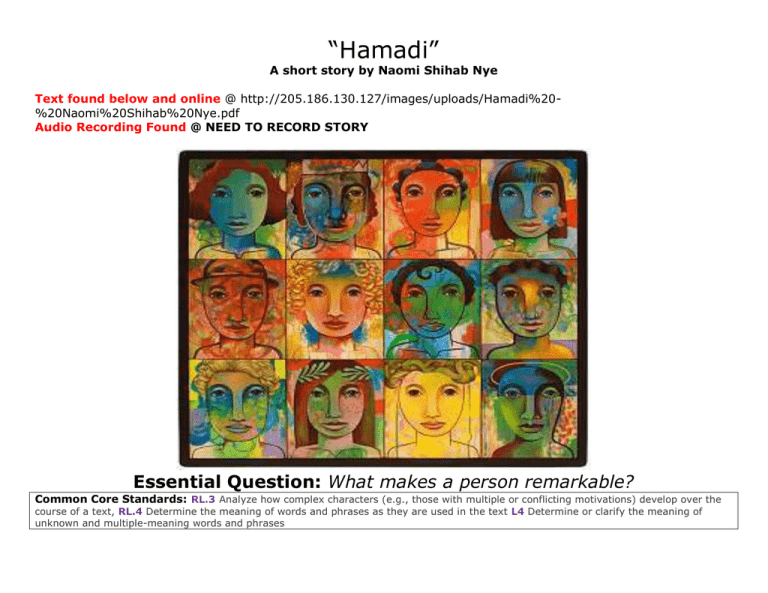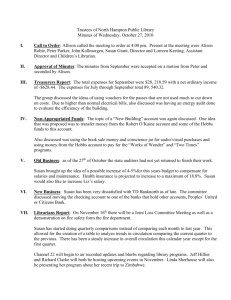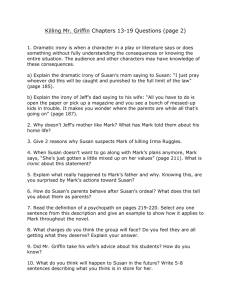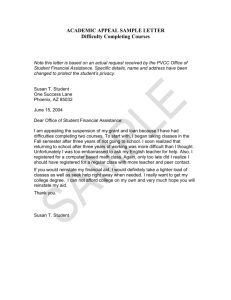Hamadi Close Read and After Reading Questions
advertisement

“Hamadi” A short story by Naomi Shihab Nye Text found below and online @ http://205.186.130.127/images/uploads/Hamadi%20%20Naomi%20Shihab%20Nye.pdf Audio Recording Found @ NEED TO RECORD STORY Essential Question: What makes a person remarkable? Common Core Standards: RL.3 Analyze how complex characters (e.g., those with multiple or conflicting motivations) develop over the course of a text, RL.4 Determine the meaning of words and phrases as they are used in the text L4 Determine or clarify the meaning of unknown and multiple-meaning words and phrases Introduction: Some people have qualities that are impossible to ignore. Some people are outrageously hilarious or obviously confident. In the short story “Hamadi,” the main character Susan has a friend with a unique perspective of the world. Susan finds her friend, Hamadi, remarkable and fascination because of his exceptional personality. Connect: What makes people stand out to you? What personality traits give them extraordinary personalities? Think of one person you find exceptional and make a list of his or her personality traits. Next, share this information with a classmate in a way that communicates to them why this person is so extraordinary. Analyzing the Text: Third Person Limited Point of View This story is told from the third-person limited point of view. The narrator is an outside speaker/voice that shares what only one character is thinking, feeling, and seeing. The narrator focuses on the thoughts and feelings of a high school freshman named Susan. Pay very close attention to the way that the author of the story develops the character of Susan. Think about what the narrator reveals about her and how this information shapes your understanding and perceptions of her. Reading Strategy: Be an Active Reader through Monitoring It’s important that as you read, you stop to monitor, or check, how well you understand what you are reading. There are five key ways to do this: Visualize – Picture the setting, the events, and the characters as you read Clarify – stop frequently to review what you understand Question – Ask questions about what is happening as your read Predict – Look for clue for what might happen next Connect – Compare events with your own personal life experiences Use the monitoring techniques as your read to help you achieve insight into the characters. Vocabulary in Context Which of the words from the Word List might be used to describe…. 1. A luxuriant piece of furniture? 2. A prehistoric language? 3. A vacant garage? 4. A subtle joke? 5. A meal after a long trip? Word List: Anthem Archaic Expansive Lavish Spartan Surrogate Sustenance wry About the Author Naomi Shihab Nye was born in 1952 in St. Louis Missouri. Like the main character Susan in the short story “Hamadi,” Nye’s grew up in an Arab-American family. When he was in high school, her family moved to the Middle East, and she spent her freshman year of high school in East Jerusalem, which was then a part of Jordan. Nye says that experience changed her forever. “This is one of the best things about growing up in a mixed family or community, “ she says. “ You never think only one way of doing or seeing anything is right.” Nye is best known for her poetry. In all of her work, she focuses on honoring diverse perspectives and the integration of cultures. Nye says that literature gives readers “insight into all the secret territories of the human spirit.” The author speaks about poetry @ http://www.youtube.com/watch?v=rkezDkKMJbE “Hamadi” – Story Background In this story, both the main character’s father and friend Hamadi come from an area torn by constant conflict. Hamadi is from Lebanon, a country shattered by a 16-year civil war. Her father is from Palestine which suffered from a 50 year war between Israelis and the Palestine people. Both of these violent situations have created millions of refugees who have fled their homelands in serve of a new life. Hamadi Close Reading Close Reading Analyze Visuals – Susan daydreams about Hamadi to escape her everyday reality. What aspects of this painting have a dreamlike quality? Susan didn’t really feel interested in Saleh Hamadi until she was a freshman in high school carrying a thousand questions around. Why this way? Why not another way? Who said so and why can’t I say something else? Those brittle women at school in the counselor’s office treated the world as if it were a yardstick and they had tight hold of both ends. Sometimes Susan felt polite with them, sorting attendance cards during her free period, listening to them gab about fingernail polish and television. And other times she felt she could run out of the building yelling. That’s when she daydreamed about Saleh Hamadi, who had nothing to do with any of it. Maybe she thought of him as escape, the way she used to think about the Sphinx at Giza when she was younger. She would picture the golden Sphinx sitting quietly in the desert with sand blowing around its face, never changing its expression. She would think of its wry, slightly crooked mouth and how her grandmother looked a little like that as she waited for her Wry (adj.)- dryly humorous, often with a bit of irony bread to bake in the old village north of Jerusalem. Susan’s family had lived in Jerusalem for three years before she was ten and drove out to see her grandmother every weekend. They would find her patting fresh dough between her hands, or pressing cakes of dough onto the black rocks in the taboon, the rounded old oven outdoors. Sometimes she moved her lips as she worked. Was she praying? Singing a secret song? Susan had never seen her grandmother rushing. Monitor: Reread the highlighted lines. As you read visualize the scene Susan remembers. Describe Susan’s grandmother’s traits. Now that she was fourteen, she took long walks in America with her father down by the drainage ditch at the end of their street. Pecan trees shaded the path. She tried to get him to tell stories about his childhood in Palestine. She didn’t want him to forget anything. She helped her American mother complete tedious kitchen tasks without complaining—rolling grape leaves around their lemony rice stuffing, scrubbing carrots for the roaring juicer. Some evenings when the soft Texas twilight pulled them all outside, she thought of her far-away grandmother and said, “Let’s go see Saleh Hamadi. Wouldn’t he like some of that cheese pie Mom made?” And they would wrap a slice of pie and drive downtown. Somehow he felt like a good substitute for a grandmother, even though he was a man. Point of View: What important character traits of Susan’s does Usually Hamadi was wearing a white shirt, shiny black tie, and a jacket that reminded Susan of the the narrator reveal in earth’s surface just above the treeline on a mountain—thin, somehow purified. He would raise his this paragraph? hands high before giving advice. “It is good to drink a tall glass of water every morning upon arising!” If anyone doubted this, he would shake his head. “Oh Susan, Susan, Susan,” he would say. He did not like to sit down, but he wanted everyone else to sit down. He made Susan sit on the wobbly chair beside the desk and he made her father or mother sit in the saggy center of the bed. He told them people should eat six small meals a day. They visited him on the sixth floor of the Traveler’s Hotel, where he had lived so long nobody could remember him ever traveling. Susan’s father used to remind him of the apartments available over the Victory Cleaners, next to the park with the fizzy pink fountain, but Hamadi would shake his head, pinching kisses at his spartan room. “A white handkerchief spread across a tabletop, my two extra shoes lined by the wall, this spells ‘home’ to me, this says ‘mi casa.’ What more do I need?” Hamadi liked to use Spanish words. They made him feel expansive, worldly. He’d learned them when Spartan (adj)- simple, plain, and frugal he worked at the fruits and vegetables warehouse on Zarzamora Street, marking off crates of apples and avocados on a long white pad. Occasionally he would speak Arabic, his own first language, with Susan’s father and uncles, but he said it made him feel too sad, as if his mother might step into the room at any minute, her arms laden with fresh mint leaves. He had come to the United States on a boat when he was eighteen years old and he had never been married. “I married books,” he said. “I married the wide horizon.” Expansive (adj)outgoing; showing feelings openly and freely. “What is he to us?” Susan used to ask her father. “He’s not a relative, right? How did we meet him to begin with?” Susan’s father couldn’t remember. “I think we just drifted together. Maybe we met at your uncle Hani’s house. Maybe that old Maronite priest who used to cry after every service introduced us. The priest once shared an apartment with Kahlil Gibran in New York—so he said. And Saleh always says he stayed with Gibran when he first got off the boat. I’ll bet that popular guy Gibran has had a lot of roommates he doesn’t even know about.” Susan said, “Dad, he’s dead.” “I know, I know,” her father said. Later Susan said, “Mr. Hamadi, did you really meet Kahlil Gibran? He’s one of my favorite writers.” Hamadi walked slowly to the window of his room and stared out. There wasn’t much to look at down on the street—a bedraggled2 flower shop, a boarded-up tavern with a hand-lettered sign tacked to the front, GONE TO FIND JESUS. Susan’s father said the owners had really gone to Alabama. Hamadi spoke patiently. “Yes, I met brother Gibran. And I meet him in my heart every day. When I was a young man—shocked by all the visions of the new world—the tall buildings—the wild traffic—the young people without shame—the proud mailboxes in their blue uniforms—I met him. And he has stayed with me every day of my life.” “But did you really meet him, like in person, or just in a book?” He turned dramatically. “Make no such distinctions, my friend. Or your life will be a pod with only dried-up beans inside. Believe anything can happen.” Susan’s father looked irritated, but Susan smiled. “I do,” she said. “I believe that. I want fat Monitor -Reread the bolded passage. Do you think Hamadi actually met Gibran in person? What do readers learn about Hamadi’s beans. If I imagine something, it’s true, too. Just a different kind of true.” Susan’s father was twiddling with the knobs on the old-fashioned sink. “Don’t they even give you hot water here? You don’t mean to tell me you’ve been living without hot water?” character from his response to the question? On Hamadi’s rickety desk lay a row of different “Love” stamps issued by the post office. “You must write a lot of letters,” Susan said. “No, no, I’m just focusing on that word,” Hamadi said. “I particularly like the globe in the shape of a heart,” he added. “Why don’t you take a trip back to his village in Lebanon?” Susan’s father asked. “Maybe you still have relatives living there.” Hamadi looked pained. “‘Remembrance is a form of meeting,’ my brother Gibran says, and I do believe I meet with my cousins every day.” “But aren’t you curious? You’ve been gone so long! Wouldn’t you like to find out what has happened to everybody and everything you knew as a boy?” Susan’s father traveled back to Jerusalem once every year to see his family. Monitor-Reread the bolded passage. The narrator does not explicitly share Hamadi’s inner thoughts, but he does give clues about how Hamadi feels. What clues does the narrator provide and what do they tell the reader about Hamadi? “I would not. In fact, I already know. It is there and it is not there. Would you like to share an orange with me?” His long fingers, tenderly peeling. Once when Susan was younger, he’d given her a lavish ribbon off a holiday fruit basket and expected her to wear it on her head. In the car, Susan’s father said, “Riddles. He talks in riddles. I don’t know why I have patience with him.” Susan stared at the people talking and laughing in the next car. She did not even exist in their world. Susan carried The Prophet around on top of her English textbook and her Texas history. She and her friend Tracy read it out loud to one another at lunch. Tracy was a junior—they’d met at the literary magazine meeting where Susan, the only freshman on the staff, got assigned to do proofreading. They never ate in the cafeteria; they sat outside at picnic tables with sack lunches, whole wheat crackers and Lavish (adj)extravagant; more than is needed Common Core L4 Language Coach Multiple Meanings – The phrase “given up” has more than one meaning. In this fresh peaches. Both of them had given up meat. Tracy’s eyes looked steamy. “You know that place where Gibran says, ‘Hate is a dead thing. Who of you would be a tomb?’” paragraph it means “stopped.” What does it mean in this sentence “By the end of the 4th quarter, the team had given up”? Analyze Visuals – Compare the mood of this painting with the first painting you analyzed. Think about the colors and the facial expressions of the characters. What is the same? What is different? Susan nodded. Tracy continued. “Well, I hate someone. I’m trying not to, but I can’t help it. I hate Debbie for liking Eddie and it’s driving me nuts.” “Why shouldn’t Debbie like Eddie?” Susan said. “You do.” Tracy put her head down on her arms. A gang of cheerleaders walked by giggling. One of them flicked her finger in greeting. “In fact, we all like Eddie,” Susan said. “Remember, here in this book—wait and I’ll find it—where Gibran says that loving teaches us the secrets of our hearts and that’s the way we connect to all of Life’s heart? You’re not talking about liking or loving, you’re talking about owning.” Tracy looked glum. “Sometimes you remind me of a minister.” Susan said, “Well, just talk to me someday when I’m depressed.” Susan didn’t want a boyfriend. Everyone who had boyfriends or girlfriends all seemed to have troubles. Susan told people she had a boyfriend far away, on a farm in Missouri, but the truth was, boys Making Inferences: Reflect on what you know about Susan. Why does Tracy compare her still seemed like cousins to her. Or brothers. Or even girls. to minister? Explain your answer using details. A squirrel sat in the crook of a tree, eyeing their sandwiches. When the end-of-lunch bell blared, Susan and Tracy jumped—it always seemed too soon. Squirrels were lucky; they didn’t have to go to school. Susan’s father said her idea was ridiculous: to invite Saleh Hamadi to go Christmas caroling with the English Club. “His English is archaic, for one thing, and he won’t know any of the songs.” “How could you live in America for years and not know ‘Joy to the World’ or ‘Away in a Manger’?” archaic (adj) – very old; ancient “Listen, I grew up right down the road from ‘Oh Little Town of Bethlehem’ and I still don’t know a single verse.” “I want him. We need him. It’s boring being with the same bunch of people all the time.” So they called Saleh and he said he would come—“thrilled” was the word he used. He wanted to ride the bus to their house, he didn’t want anyone to pick him up. Her father muttered, “He’ll probably forget to get off.” Saleh thought “caroling” meant they were going out with a woman named Carol. He said, “Holiday spirit—I was just reading about it in the newspaper.” Susan said, “Dress warm.” Point of View – Why is Hamadi so interesting to Susan? Would you be able to answer this question if Susan was not the point-of-view character? Saleh replied, “Friend, my heart is warmed simply to hear your voice.” All that evening Susan felt light and bouncy. She decorated the coffee can they would use to collect donations to be sent to the children’s hospital in Bethlehem. She had started doing this last year in middle school, when a singing group collected $100 and the hospital responded on exotic onion-skin stationery that they were “eternally grateful.” Her father shook his head. “You get something into your mind and it really takes over,” he said. “Why do you like Hamadi so much all of a sudden? You could show half as much interest in your own uncles.” Susan laughed. Her uncles were dull. Her uncles shopped at the mall and watched TV. “Anyone who watches TV more than twelve minutes a week is uninteresting,” she said. Her father lifted an eyebrow. “He’s my surrogate grandmother,” she said. “He says interesting things. He makes me think. Remember when I was little and he called me The Thinker? We have a connection.” She added, “Listen, do you want to go too? It is not a big deal. And Mom has a great voice, why don’t you both come?” Surrogate (adj)serving as a substitute Clarify-Why does Susan call Hamadi her “surrogate grandmother”? A minute later her mother was digging in the closet for neck scarves, and her father was digging in the drawer for flashlight batteries. Saleh Hamadi arrived precisely on time, with flushed red cheeks and a sack of dates stuffed in his pocket. “We may need sustenance on our journey.” Susan thought the older people seemed quite giddy as they drove down to the high school to meet the rest of the carolers. Strands of winking lights wrapped around their neighbors’ drainpipes and trees. A giant Santa tipped his hat on Dr. Garcia’s roof. Sustenance (noun)food Her friends stood gathered in front of the school. Some were smoothing out song sheets that had been crammed in a drawer or cabinet for a whole year. Susan thought holidays were strange; they came, and you were supposed to feel ready for them. What if you could make up your own holidays as you went along? She had read about a woman who used to have parties to celebrate the arrival of fresh asparagus in the local market. Susan’s friends might make holidays called Eddie Looked at Me Today and Smiled. Two people were alleluia-ing in harmony. Saleh Hamadi went around the group formally introducing himself to each person and shaking hands. A few people laughed behind their hands when his back was turned. He had stepped out of a painting, or a newscast, with his outdated long overcoat, his clunky old men’s shoes and elegant manners. Susan spoke more loudly than usual. “I’m honored to introduce you to one of my best friends, Mr. Hamadi.” “Good evening to you,” he pronounced musically, bowing a bit from the waist. What could you say back but “Good evening, sir.” His old-fashioned manners were contagious. They sang at three houses which never opened their doors. They sang “We Wish You a Merry Christmas” each time they moved on. Lisa had a fine, clear soprano. Tracy could find the alto harmony to any line. Cameron and Elliot had more enthusiasm than accuracy. Lily, Rita, and Jeannette laughed every time they said a wrong word and fumbled to find their places again. Susan loved to see how her mother knew every word of every verse without looking at the paper, and her father kept his hands in his pockets and seemed more interested in examining people’s mailboxes or yard displays than in trying to sing. And Saleh Hamadi—what language was he singing in? He didn’t even seem to be pronouncing words, but humming deeply from his throat. Was he saying, “Om?” Speaking Arabic? Once he caught her looking and whispered, “That was an Aramaic word that just drifted into my Common Core L4c – Language Coach Etymology- Reread the bolded line. The etymology, or history of a word, of the word alleluia shows that it is a Middle English word conveying joy, praise, or thanks. It’s from an even older Hebrew word still used today. In a dictionary, find the Hebrew word for alleluia. mouth—the true language of the Bible, you know, the language Jesus Christ himself spoke.” By the fourth block their voices felt tuned up and friendly people came outside to listen. Trays of cookies were passed around and dollar bills stuffed into the little can. Thank you, thank you. Out of the dark from down the block, Susan noticed Eddie sprinting toward them with his coat flapping, unbuttoned. She shot a glance at Tracy, who pretended not to notice. “Hey, guys!” shouted Eddie. “The first time in my life I’m late and everyone else is on time! You could at least have left a note about which way you were going.” Someone slapped him on the back. Saleh Hamadi, whom he had never seen before, was the only one who managed a reply. “Welcome, welcome to our cheery group!” Eddie looked mystified. “Who is this guy?” Susan whispered, “My friend.” Eddie approached Tracy, who read her song sheet intently just then, and stuck his face over her shoulder to whisper, “Hi.” Tracy stared straight ahead into the air and whispered “Hi” vaguely, glumly. Susan shook her head. Couldn’t Tracy act more cheerful at least? They were walking again. They passed a string of blinking reindeer and a wooden snowman holding a painted candle. Ridiculous! Monitor- Reread the Susan’s response to Eddie’s question about Hamadi. How has Susan’s attitude about Hamadi changed? Eddie fell into step beside Tracy, murmuring so Susan couldn’t hear him anymore. Saleh Hamadi was flinging his arms up high as he strode. Was he power walking? Did he even know what power walking was? Between houses, Susan’s mother hummed obscure songs people never remembered: “What Child Is This?” and “The Friendly Beasts.” Lisa moved over to Eddie’s other side. “I’m so excited about you and Debbie!” she said loudly. “Why didn’t she come tonight?” Eddie said, “She has a sore throat.” Tracy shrank up inside her coat. Lisa chattered on. “James said we should make our reservations now for dinner at the Tower after the Sweetheart Dance, can you believe it? In December, making a reservation for February? But otherwise it might get booked up!” Connect: Reflect on how Tracy’s behavior and how she is feeling. Can you connect her behavior to anything you’ve experienced? Saleh Hamadi tuned into this conversation with interest; the Tower was downtown, in his neighborhood. He said, “This sounds like significant preliminary planning! Maybe you can be an international advisor someday.” Susan’s mother bellowed, “Joy to the World!” and voices followed her, stretching for notes. Susan’s father was gazing off into the sky. Maybe he thought about all the refugees in camps in Palestine far from doorbells and shutters. Maybe he thought about the horizon beyond Jerusalem when he was a boy, how it seemed to be inviting him, “Come over, come over.” Well, he’d come all the way to the other side of the world, and now he was doomed to live in two places at once. To Susan, immigrants seemed bigger than other people, and always slightly melancholy. They also seemed doubly interesting. Maybe someday Susan would meet one her own age. Two thin streams of tears rolled down Tracy’s face. Eddie had drifted to the other side of the group and was clowning with Cameron, doing a tap dance shuffle. “While fields and floods, rocks hills and plains, repeat the sounding joy, repeat the sounding joy” Susan and Saleh Hamadi noticed her. Hamadi peered into Tracy’s face, inquiring, “Why? Is it pain? Is it gratitude? We are such mysterious creatures, human beings!” Tracy turned to him, pressing her face against the old wool of his coat, and wailed. The song ended. All eyes on Tracy, and this tall, courteous stranger who would never in a thousand years have felt comfortable stroking her hair. But he let her stand there, crying as Susan stepped up to stand firmly on the other side of Tracy, putting her arms around her friend. Hamadi said something Susan would remember years later, whenever she was sad herself, even after college, a creaky anthem sneaking back into her ear, “We go on. On and on. We don’t stop where it hurts. We turn a corner. It is the reason why we are living. To turn a corner. Come, let’s move.” Common Core L4 Figurative Language Reread the bolded lines. In this sentence the horizon beyond Jerusalem seems to invite Susan’s father to “come over.” By assigning a personal quality to the horizon, the author is using personification, a kind of figurative language. By employing personification, Nye is communicating the particular historical and cultural situation of Susan’s father, an immigrant from Palestine who laments for his homeland. What else can be communicated by utilizing personification? Anthem (noun) – an inspirational song Above them, in the heavens, stars lived out their lonely lives. People whispered, “What happened? What’s wrong?” Half of them were already walking down the street. After Reading Questions After Reading Questions Common Core Standard: RL 3 Analyze how complex characters develop over the course of a text. 1. 2. 3. 4. (Recall, DOK 1) Why does Susan start to feel intrigued by Hamadi? (Recall, DOK 1) What does Susan invite Hamadi to do? (Clarify, DOK 1) What happens to Tracy at the end of the story? (Evaluate, DOK 2) Review the monitoring strategies from the notes. Which of the five strategies did you find the most helpful while you were reading? Provide example. Use the graphic organizer below if necessary. Strategy Example 5. (Analyze Point of View, DOK 3) – How would this story be different if Hamadi told it from a first-person point of view? How might your understanding and perception of Hamadi change? 6. (Formulate Conclusions, DOK 3) Reread the lines from the story below. Why do you think Hamadi’s words have a profound effect on Susan? Using evidence from the text, describe why you think she finds Hamadi’s words so meaningful. “We go on. On and On. We don’t stop when it hurts. We turn a corner. It is the reason we are living. It turn a corner. Come, let’s move.” 7. (Analyze Character, DOK 3) A round character is one who is complex and highly developed, demonstrating a diversity of different traits in his or her personality. A flat character is not highly developed. He or she typically has one excellent trait or role and exists mostly to progress the plot of a story. Identify one round character and one flat character from the story. Then clarify how each fits the criteria above. Flat Character = Traits - Round Character = Traits – 8. (Compare Literary Texts DOK 4) Compare Susan with Jill, the narrator of “Pancakes.” Use the Venn diagram below to record Susan’s and Jill’s personality traits. Which character has the more remarkable personality? Susan’s Traits Jill’s Traits 9. (Text Criticism, DOK 4) After reading Nye’s very first novel, Habibi, literature critic Karen Leggett wrote, “Adolescence magnifies the joys and an anxiety of growing up even as it radically simplifies the complexities of the adult world…Nye is meticulously sensitive to this rainbow of emotion…” Paraphrase this quote into your own words, and then decide how this quote applies to the short story “Hamadi.” 10.Enduring Understanding: After reading this short story, has your answer to the essential question “What makes a person remarkable” changed? Explain your answer.




